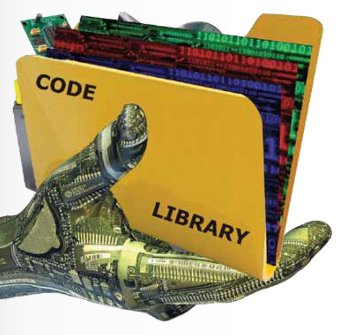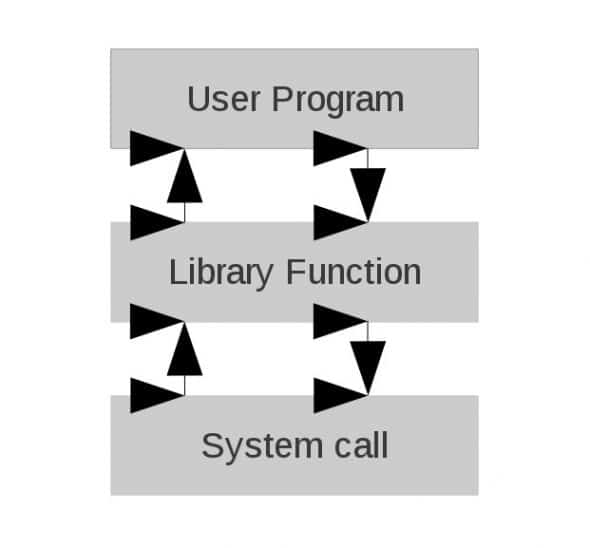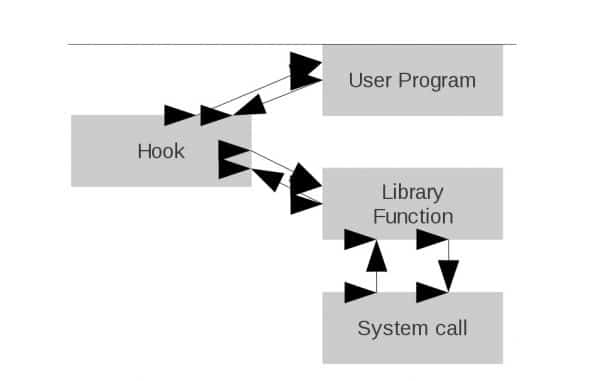
According to Wikipedia, “In computer programming, the term hooking covers a range of techniques used to alter or augment the behaviour of an operating system, applications, or other software components, by intercepting function calls or messages or events passed between software components. Code that handles such intercepted function calls, events or messages is called a hook.”
Intercepting a library call, and calling your own wrapper code, is also called Function Interposition.
Hooking has two benefits:
- You don’t have to search for the function definition in the library, such as
libc(glibcis the GNU C Library, andlibcis almost half of the size ofglibc) and change it. Seriously, this is a very nasty technical task (at least for me!). - You don’t need to recompile the library’s source code.
Library functions and system calls
Please look at Figures 1 and 2 for a graphical representation of what happens when a library function is hooked.


Now let’s look at hooking a library function. The simple prog1.c program below just allocates 10 bytes of memory from the heap, and frees it:
#include<stdio.h>
#include<malloc.h>
#include<stdlib.h>
int main(void)
{
int *p;
printf("calling from main...\n");
p=(int *)malloc(10);
if(!p)
{
printf("Got allocation error...\n");
exit(1);
}
printf("returning to main...\n");
free(p); /* freeing memory from heap */
printf("freeing memory...\n");
return 0;
}
When we compile and run the above program, the output is as shown below:
[root@workbenchsvr malloc_hook]# gcc -o prog1 prog1.c [root@workbenchsvr malloc_hook]# ./prog1 calling from main... returning to main... freeing memory... [root@workbenchsvr malloc_hook]#
The next program, called prog2.c, is a simple hook for the malloc() function:
#define _GNU_SOURCE
#include <stdio.h>
#include <stdint.h>
#include <dlfcn.h> /* header required for dlsym() */
/* lcheck() is for memory leak check; its code is not shown
here */
void lcheck(void);
void* malloc(size_t size)
{
static void* (*my_malloc)(size_t) = NULL;
printf("inside shared object...\n");
if (!my_malloc)
my_malloc = dlsym(RTLD_NEXT, "malloc"); /* returns the object reference for malloc */
void *p = my_malloc(size); /* call malloc() using function pointer my_malloc */
printf("malloc(%d) = %p\n", size, p);
lcheck(); /* calling do_your_stuff function */
printf("returning from shared object...\n");
return p;
}
void lcheck(void)
{
printf("displaying memory leaks...\n");
/* do required stuff here */
}
Compiling and running the above, goes like this:
[root@workbenchsvr malloc_hook]# gcc -shared -ldl -fPIC prog2.c -o libprog2.so [root@workbenchsvr malloc_hook]# LD_PRELOAD=/home/dibyendu/malloc_hook/libprog2.so ./prog1 calling from main... inside shared object... malloc(10) = 0x8191008 displaying memory leaks... returning from shared object... returning to main... freeing memory... [root@workbenchsvr malloc_hook]#
So, let’s take a closer look at our first hook. The dlsym() function takes two parameters: the first is a handle returned by dlopen(). Here, we must use RTLD_NEXT for function interposition.
This tells the dynamic linker to find the next reference to the specified function, not the one that is calling dlsym(). The second parameter is the symbol name (malloc, in this case), as a character string. dlsym() returns the address of the symbol specified as the second parameter. While compiling, fPIC is used to create a position-independent object.
The LD_PRELOAD environment variable gives the loader a list of libraries to load before anything else. Our use of it will load libprog2.so and dynamically link it with the prog1 binary. Don’t forget to provide an absolute path to the .so, in LD_PRELOAD. And, of course, include _GNU_SOURCE if you want to use certain extensions while using the GNU C library, because some extensions may not be available on other non-GNU systems and adding this #define will increase portability.
Can we hook every function with dlsym()?
The above hook method will not work if you want to wrap dlsym() itself, or wrap any library functions that internally call dlsym(). So, is there any way to interpose dlsym()? Yes, but you can’t use the same hook procedure — check the output if you try that. First, create a shared object libfile.so from file1.c and file2.c (below). Then compile it with gcc -rdynamic -o dl_prog1 dl_prog1.c -ldl. Yes, the output is obvious:
/* file1.c */
void file1(int *i)
{
*i=100;
}
/* file2.c */
void file2(int *i)
{
*i=200;
}
The following dl_prog1.c is a simple program to show the functionality of dlopen() and dlsym(). The functions file1() and file2() are defined in file1.c and file2.c.
#include<stdio.h>
#include<dlfcn.h>
#include<stdlib.h>
void file1(int *i);
void file2(int *i);
int main(void)
{
void *handler;
int (*fn) (int *);
int x;
char *error;
handler = dlopen("/home/dibyendu/dlsym_hook/libfile.so", RTLD_LAZY);
if (!handler)
{
fprintf(stderr,"%s\n", dlerror());
exit(1);
}
fn = dlsym(handler,"file1"); /* getting the handle of file1 through dlsym() */
if ((error = dlerror()) != NULL) /* checking error through dlerror() */
{
fprintf(stderr,"%s\n", error);
exit(1);
}
(*fn)(&x); /* Calling file1() to resolve x */
printf("The value of x is %d\n", x);
dlclose(handler); /* closing the file handle */
return 0;
}
[root@workbenchsvr dlsym_hook]# gcc -shared -ldl -fPIC file1.c file2.c -o libfile.so [root@workbenchsvr dlsym_hook]# gcc -rdynamic -o dl_prog1 dl_prog1.c -ldl [root@workbenchsvr dlsym_hook]# ./dl_prog1 The value of x is 100 [root@workbenchsvr dlsym_hook]#
Now try to hook dlsym(), and you will get a segmentation fault, due to recursive calls (dlsym() will call itself). The following dl_prog2.c will be a recursive dlsym() call to itself, which causes a stack overflow and segmentation fault:
#define _GNU_SOURCE
#include <stdio.h>
#include <stdint.h>
#include <dlfcn.h>
void *dlsym(void *handle, const char *name)
{
void *(*dlsym_fn)(void *, const char *)=NULL;
printf("inside shared object::before dlsym()...\n");
dlsym_fn=dlsym(RTLD_NEXT, "dlsym"); /* this will call itself again and again */
printf("inside shared object::after dlsym()...\n");
return (*dlsym_fn)(handle, name);
}
Output:
[root@workbenchsvr dlsym_hook]# gcc -shared -ldl -fPIC dl_prog2.c -o libdl_prog2.so [root@workbenchsvr dlsym_hook]# LD_PRELOAD=/home/dibyendu/dlsym_hook/libdl_prog2.so ./dl_prog1 inside shared object::before dlsym()... …............................................................... inside shared object::before dlsym()... Segmentation fault [root@workbenchsvr dlsym_hook]#
Here is the code (dl_prog3.c) that successfully interposes dlsym():
#define __USE_GNU
#include <stdio.h>
#include <stdlib.h>
#include <dlfcn.h>
extern void *__libc_dlsym (void *, const char *);
void *dlsym(void *handle, const char *symbol)
{
printf("Ha Ha...dlsym() Hooked\n");
void* result = __libc_dlsym(handle, symbol); /* now, this will call dlsym() library function */
return result;
}
Output:
[root@workbenchsvr dlsym_hook]# gcc -shared -ldl -fPIC dl_prog3.c -o libdl_prog3.so [root@workbenchsvr dlsym_hook]# LD_PRELOAD=/home/dibyendu/dlsym_hook/libdl_prog3.so ./dl_prog1 Ha Ha...dlsym() Hooked The value of x is 100 [root@workbenchsvr dlsym_hook]#
What else can we do?
I have already interposed other functions like getaddrinfo(), open(), etc, so you can intercept any function you want. But there are a few limitations:
- Do beware of functions that themselves call
dlsym(), when you need to call__libc_dlsym(handle, symbol) in the hook. - Ensure that the SUID bit is not set, otherwise you can’t use
LD_PRELOAD. - Also, internal library function calls are resolved before runtime — say, if some function in
libccallsgetaddrinfo()ormalloc(), it will never call the hook from a different library.
References
- Tutorial: Function Interposition in Linux by Jay Conrod
- Linux man pages:
dlopen(),dlsym(),dlerror(),dlclose()













































































Great post!
nice post, but doesn’t work for me when I try to give multiple arguments.
Nice post, but the last sentence should have been the first…
Simple, so it is wonderful.
i read the article ,it’s coll~
Just a note on your first example – on my Linux system, for the shared object libprog2.so, the -ldl linker flag must be after the prog1.c parameter, otherwise libdl is not linked into the shared object and the error “undefined symbol: dlsym” will occur at runtime.
Hi Dibyendu,
Is there any way we can hook user program functions also?
Hey, and how to deal with library function calls resolved before runtime?
Give plz any clue!